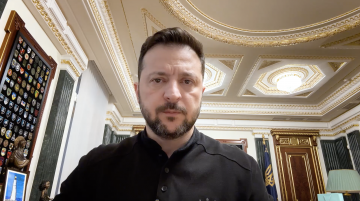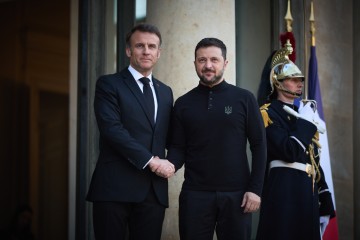The President of Ukraine looks back at what got him through his first year in office.
Last year on May 20, I was surrounded by crowds of people shaking hands, high-fiving and leaning in for selfies as they gathered to watch my inauguration. Ukrainians had elected me with 73 percent of the vote, pinning their hopes on me to clean up a corrupt government and bring stability.
I never thought being president would be easy. My previous job was as a comedy writer and producer; the team that I brought in was full of smart, energetic, capable and dedicated people, but many lacked political experience. We had high hopes and a fierce commitment to improving our embattled country, both at home and on the world stage.
Then the past year happened.
Let’s start long before “coronavirus” was a familiar word. Remember President Trump’s impeachment? After chasing higher ratings for most of my life in the entertainment business, it took only one phone call to become truly world famous. The impeachment story was not comfortable for me. It took American and international attention away from the issues that mattered most to Ukraine and turned our country into a story about President Trump.
The other major challenge of my presidency is one that I inherited: For six years, the part of the Donbas region in eastern Ukraine has been occupied by Russian-backed illegal armed groups. Millions have lost their homes in the fighting, tens of thousands have been seriously wounded, and around 14,000 lives have been lost. When I came to office, the war was stuck in a stalemate, with more lives lost nearly every day.
That all may sound like ancient history because in March, I was forced to face yet another major crisis, though one that I share with every other leader in the world: the coronavirus pandemic. Ukraine has had more than 19,000 Covid-19 cases and, sadly, nearly 600 deaths. We have been forced to restructure our budget planning to cope with the global economic crash.
But it’s not all doom and gloom. The silver lining that gives me hope amid all of these crises has been the same thing: international cooperation. It has been and will continue to be the way forward.
No matter how many opinions, rumors and theories swirled around about my phone call with my American counterpart, and despite the fact that the controversy resulted in Mr. Trump’s impeachment, Ukraine remains a good partner and friend of the United States. We received the military assistance we needed to continue to ensure our country’s independence. We enjoy the support of both Democrats and Republicans, as well as ordinary people across the United States. (One bright spot to come out of the controversy: I’m sure that many more Americans and Western Europeans can now find Ukraine on the map!)
When it comes to the war in eastern Ukraine, my administration understands that diplomacy and dialogue are the only options. I made it an early priority to resume meetings between the leaders of Germany, France, Ukraine and Russia to discuss peace. We restarted dialogue with Russia, and it returned three ships and 24 Ukrainian sailors captured a year earlier; there has been some disengagement of forces in Donbas; and prisoner exchanges have enabled 131 Ukrainians to return home. Still, the war in Ukraine undermines the security and stability of Europe, and we will need further help from our allies to end it.
Of course, I recognize that the pandemic has disrupted everything. Social distancing goes hand-in-hand with political distancing. The crisis has forced many countries to focus first on their domestic problems. This is understandable, but in an age of transnational crises that don’t stop at borders, we must not lose the focus on the tremendous positive potential of international cooperation.
Ukraine is not a wealthy nation, but we decided we had to do whatever we could to help those suffering. Ukrainian engineers have designed and built the world’s largest cargo plane, which has delivered medical supplies from China to Poland, France, Germany and other European Union countries. In early April, we sent some of our doctors to Italy. Their work treating patients there has helped us to learn lessons about the spread of the disease that are now informing our own quarantine procedures and in turn, helping to save lives here.
We also received support from many: The United States and the European Union provided millions of dollars and euros in financial assistance to fight the coronavirus; Turkey and the United Arab Emirates sent us needed humanitarian help in the form of medical equipment and protective equipment. We are waiting for the promised assistance from the International Monetary Fund and others to stabilize the economy after the pandemic.
The road to recovery is long. The war in Donbas is not yet over. But as I look back at my first year in office and ahead to my second, I have hope. Together, we are going to make the world — and Ukraine — a better place.



